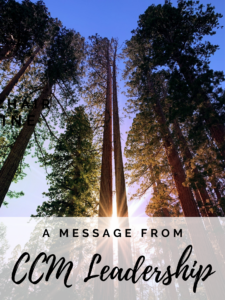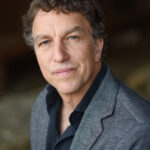 I want to add my voice to the chorus congratulating our new graduates here at CCM. And even while blessing this occasion – and it is not just a nice thing to do, but a joyful necessity to bless arrivals such as this – I want to reflect a little on the phenomenon of continuing.
I want to add my voice to the chorus congratulating our new graduates here at CCM. And even while blessing this occasion – and it is not just a nice thing to do, but a joyful necessity to bless arrivals such as this – I want to reflect a little on the phenomenon of continuing.
As our year of learning winds down here in Ashland, and our Va’ads get ready to take a break over the next few months, I’m aware that when saying goodbye for the Summer we often find ourselves saying some variant of, “Well, one doesn’t really take a break from Mussar….” And it’s true of course – if Mussar is a process of unfolding/awakening to the needs of the other moment by moment, then at a certain point we become aware that, by nature, this is not something we can cease, or even pause. It is inseparable from who we are becoming.
I think this is the case for any true spiritual practice – it’s real life. The formal practice just makes us conscious of what is always occurring. As we continue to deepen in relationship to our discipline, it becomes ever more apparent that what we are doing is not academic, it is not even accumulative, and there is no end point. It is a path we are walking. As Rabbi Stone often reminds us, the path to holiness is just that – a path. It is a horizon but it is not a destination.
Sometimes staying connected to Mussar seems fluid, even easy. We may occasionally change chevrutas, find ourselves inspired or embroiled in a new text, but the sticking with it feels intuitive. Other times, like in any other commitment, it takes a faith and a certain kind of perseverance – like showing up for minyan even when prayer is the last thing we want to be doing. In the prayer example, as is often taught, we show up to help someone else say kaddish, regardless of our own needs, and maybe this is the point of prayer. But I find this showing up also takes some degree of trust that the words on our tongue – which currently feel hackneyed and cloying – will someday once again be buzzing and illuminated.
The metaphor I’ve found myself using in recent weeks is that of maple sugaring. For those who have never experienced that wonderful late winter practice, it involves taking a large amount of maple water (what actually comes out of the sugar maples is much thinner and clearer) and patiently boiling it down until it achieves the consistency you want. It’s a lovely meditative practice – the heat can’t be too high, there’s nothing you can rush or hurry along. You have to just keep tending the fire, stirring, adjusting. Think of the full day one often spends sugaring as a lifetime. Slowly, sometimes painstakingly, sweetening happens. Our hidden essence (which we could name as the yetzer haTov) gradually comes to the surface. Though we often say, appropriately I think, that Mussar curbs and then (with grace) transforms the parts of ourselves that are most waylaid and self-absorbed, more and more I believe Mussar reveals something that has always been there, but has been obscured by trauma and confusion.
So, this is all to say to all our students – keep learning! Continue. Trust in the sweetening. Return to Mesillat Yesharim or Tomer Devorah if you have never read either twice or three times through. Return to a middah that turned you off a year ago but might unlock something in the current circumstances of your life. Return to certain troubled or dense relationships with a curiosity about how they might yet be different, even in subtle ways.
Jack Kornfield once said the most important question we can ask ourselves in regards whatever discipline is primary in our lives is, “Is it a path with heart?” I have found Mussar to be such a practice, but the question itself challenges me to take the initiative and make sure the Mussar I am practicing is a Mussar with heart. May all of us be blessed with a restful Summer and may our continuings, in Mussar and in all things, be alive and resonant.

Rabbi Joshua Boettiger, CCM Associate Rosh Yeshiva
